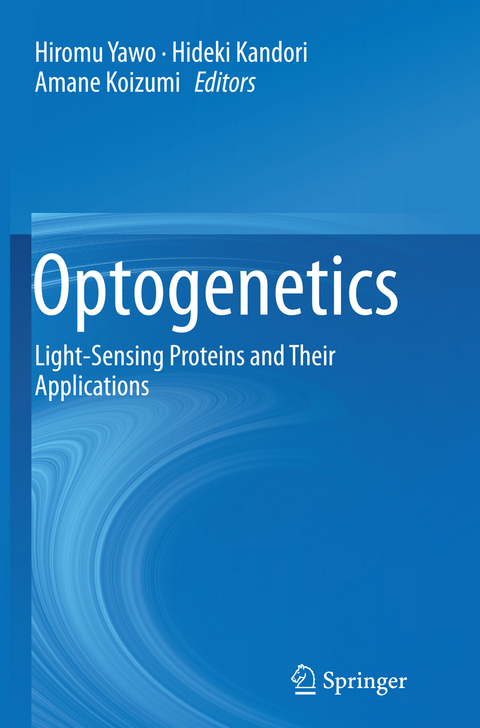
Optogenetics
Springer Verlag, Japan
978-4-431-56197-2 (ISBN)
Part I Light-Sensing Proteins.- 1 History and Perspectives of Light-Sensing Proteins (Hideki Kandori).- 2 Biology of Light-Sensing Proteins in Plants and Microorganisms (Mineo Iseki and Tetsuo Takahashi).- 3 Structure-Functional Analysis of Channelrhodopsins (Hideaki E. Kato, Ryuichiro Ishitani, and Osamu Nureki).- 4 Photochemistry of Halorhodopsin (Takashi Kikukawa, Naoki Kamo, and Makoto Demura).- 5 Molecular Mechanisms for Ion Transportation of Microbial Rhodopsins Studied by Light-Induced Difference FTIR Spectroscopy (Yuji Furutani).- 6 Optogenetic Potentials of Diverse Animal Opsins (Akihisa Terakita, Takashi Nagata, Tomohiro Sugihara, and Mitsumasa Koyanagi).- 7 Color Tuning in Retinylidene Proteins (Kota Katayama, Sivakumar Sekharan, and Yuki Sudo).- Part II Optogenetics in Biological Systems.- 8 General Description: Future Prospects of Optogenetics (Hiromu Yawo, Ryo Egawa, Shoko Hososhima, and Lei Wen).- 9 Optogenetic Manipulation and Probing (Masamichi Ohkuraand Junichi Nakai).- 10 Probing Neuronal Activity Using Genetically Encoded Red Fluorescent Calcium Indicators (Takuya Sasaki).- 11 Optogenetic Sensors for Monitoring Intracellular Chloride (Ken Berglund, Lei Wen, and George J. Augustine).- 12 Optogenetic Imaging of Protein Activity in the Synapse by Using 2-photon Fluorescence Lifetime Imaging Microscopy (Hideji Murakoshi and Akihiro C E Shibata).- 13 Optogenetics in Drosophila (Hiroshi Kohsaka and Akinao Nose).- 14 Optogenetics in Caenorhabditis elegans (Yuki Tsukada and Ikue Mori).- 15 Optogenetics Research Using the Mouse as a Model System (Kenji F. Tanaka).- Part III Optogenetics in Neuroscience.- 16 Neuroscientific Frontline of Optogenetics (Akihiro Yamanaka).- 17 Elucidation of Neuronal Circuitry Involved in the Regulation of Sleep/Wakefulness Using Optogenetics (Tomomi Tsunematsu and Akihiro Yamanaka).- 18 Optogenetic Analysis of Striatal Connections to Determine Functional Connectomes (Nao Chuhma).- 19 Potentialof Optogenetics for the Behavior Manipulation in Non-human Primates (Masaharu Kinoshita and Tadashi Isa).- 20 Activity Regulation in the Study of Neural Plasticity (Shoji Komai).- 21 Strategies to Probe Mechanoreception: From Mechanical to Optogenetic Approaches (Zhi-Gang Ji, Toru Ishizuka, and Hiromu Yawo).- 22 Casting Light on the Role of Glial Cells in Brain Function (Ko Matsui).- Part IV Medical Optogenetics.- 23 Towards Understanding the Neural Mechanism of Behavioral Phenotypes Seen in Psychiatric Disorders (Nobuhiro Nakai, Ofer Yizhar, and Toru Takumi).- 24 Establishment of Gene Therapy Using Channelrhodopsin-2 to Treat Blindness (Eriko Sugano and Hiroshi Tomita).- 25 Optogenetic Approaches to Restoring Intrinsic Visual Processing Features in Retinal Ganglion Cells (Zhuo-Hua Pan, Anding Bi, and Qi Lu).- 26 On Optogenetic Tissue Engineering on Visual Cells: A Review on Its Development, Practices, and Application (Misato Ichise and Seigo Yamada).- Part V Optogenetics andOpto-electronics.- 27 CMOS-based Neural Interface Device for Optogenetics (Takashi Tokuda, Toshihiko Noda, Kiyotaka Sasagawa, and Jun Ohta).- 28 Use of Channelrhodopsin in the Development of Neuron-Network High-Throughput Screening Devices (Tsuneo Urisu).- BM Index.
| Erscheinungsdatum | 11.11.2016 |
|---|---|
| Zusatzinfo | 111 Illustrations, color; 31 Illustrations, black and white; IX, 409 p. 142 illus., 111 illus. in color. |
| Verlagsort | Tokyo |
| Sprache | englisch |
| Maße | 155 x 235 mm |
| Themenwelt | Medizin / Pharmazie ► Studium |
| Naturwissenschaften ► Biologie ► Biochemie | |
| Naturwissenschaften ► Biologie ► Humanbiologie | |
| Naturwissenschaften ► Biologie ► Zellbiologie | |
| Naturwissenschaften ► Biologie ► Zoologie | |
| Schlagworte | Channelrhodopsin • Halorhodopsin • Neural Circuits • Optical sensors • Psychiatry • Visual prosthesis |
| ISBN-10 | 4-431-56197-8 / 4431561978 |
| ISBN-13 | 978-4-431-56197-2 / 9784431561972 |
| Zustand | Neuware |
| Informationen gemäß Produktsicherheitsverordnung (GPSR) | |
| Haben Sie eine Frage zum Produkt? |
aus dem Bereich


